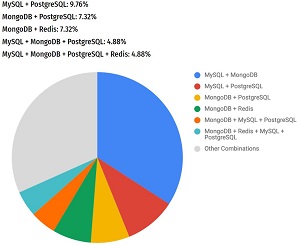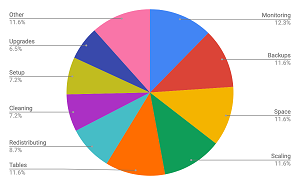News
Database Trends Report: SQL Beats NoSQL, MySQL Most Popular
- By David Ramel
- March 5, 2019
Good old-fashioned SQL still rules the database roost, though popular offerings in the NoSQL camp are closing the gap, while MySQL is the most popular of the whole bunch.
The new 2019 Database Trends report from ScaleGrid compiled the above information from data collected from a survey of attendees at the DeveloperWeek 2019 conference.
"SQL has had a large lead over the non-relational alternatives for decades, but NoSQL is quickly closing the gap with popular databases such as MongoDB, Redis and Cassandra," the report stated. "Though many organizations are choosing to migrate from legacy databases, such as Oracle, not all are moving to NoSQL way. Based on our findings, SQL still holds 60 percent with rising demand for systems such as PostgreSQL."
Among all databases, MySQL was the No. 1 choice reported by respondents, garnering mentions from about 39 percent, while MongoDB followed at about 25 percent, ahead of PosgreSQL at about 17 percent. The remaining individual databases responses -- Redis, Cassandra and Oracle -- all garnered less than about 8 percent of responses, while all other offerings were clumped into an "Other" category that contained CouchDB, Berkeley DB, Microsoft SQL Server, Redshift, Firebase, Elasticsearch and InfluxDB.
ScaleGrid noted the top databases mentioned in its report don't exactly jive with the DB-Engines ranking, especially concerning Oracle, the perennial leader in the latter index but way back at 1.8 percent in the new report. Also, although DB-Engines also ranked MySQL high, at No. 2, its No. 3-ranked database, SQL Server, was relegated to the "Other" category in the ScaleGrid report.
"So, which databases are most popular in 2019?" the report asked. "Knowing that SQL was used by over 3/5 of respondents, you might assume Oracle stole the show. Guess again. MySQL dominated this report...."
After noting the DB-Engines disconnect, ScaleGrid said, "While we expected to see a much higher presence of Oracle database users, their representation was low at the world's largest developer expo."
Other highlights of the report include:
- Single Database vs. Multi-Database Use: "Almost half of the organizations we spoke with actually use more than one type of database to power their applications than a single database! 44.3 percent reported using multiple databases, while 55.7 percent are operating with one."
- SQL & NoSQL Multiple Database Combinations: "75.6 percent of multiple database type use is made up of a combination of both SQL and NoSQL databases."
 [Click on image for larger view.]
Most Popular Multiple Database Type Combinations (source: ScaleGrid)
[Click on image for larger view.]
Most Popular Multiple Database Type Combinations (source: ScaleGrid)
- Most Popular Multiple Database Type Combinations: "The clear winner with over 1/3 of multiple database type use is the combination of MySQL and MongoDB. While MongoDB is often considered an alternative to MySQL, the two databases do work well together when properly designed. The second most popular combination was MySQL and PostgreSQL together. These two SQL databases are clear competitors, but can be jointly used to store different data sets."
- Most Time-Consuming Database Management Task: "Monitoring came in at number one with 12.6 percent from our respondents, barely breaking ahead of backups, managing disk space, scaling, and joining tables who all tied for number two with 11.6 percent each.
 [Click on image for larger view.]
Most Time-Consuming Database Management Task (source: ScaleGrid)
[Click on image for larger view.]
Most Time-Consuming Database Management Task (source: ScaleGrid)
"Standalone at number three was maintaining and redistributing changes between views and stored programs at 8.7 percent, and again a tie at number 4 with 7.2 percent for each cleaning and database setup."
-
Most Important Metric Tracked For Database Performance: "Query response time was not only the most tracked metric, but also the majority with 51.8 percent of responses! We expected this to lead as it came in at 30.8 percent from a Most Time-Consuming PostgreSQL Management Task report we compiled in October of 2018, but significantly increased when we expanded this question to all database management systems. Query speed is an extremely important metric to track on a continuous basis so you can identify slow-running queries that could be affecting your application performance."
While ScaleGrid didn't provide methodology for the report, the firm said it polled "hundreds of developers, engineers, software architects, dev teams, and IT leaders."
ScaleGrid offers a managed Database-as-a-Service (DBaaS) platform that supports MongoDB, Redis, MySQL and PostgreSQL on both public and private clouds.
About the Author
David Ramel is an editor and writer at Converge 360.